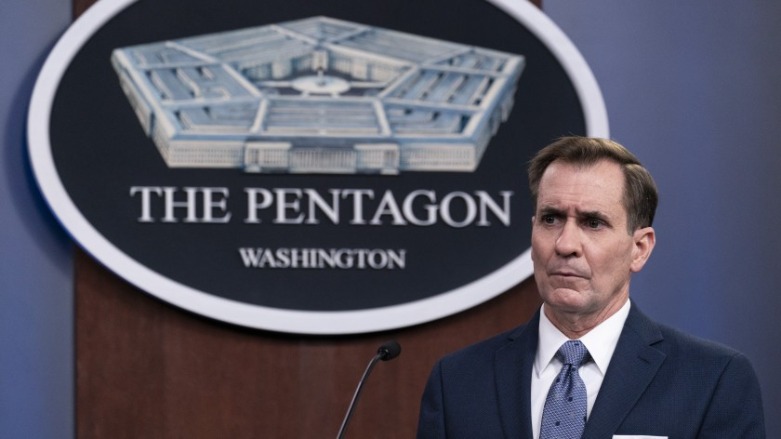Pentagon: 'US forces will remain in Iraq'
"US forces will remain in Iraq, of course," Kirby continued, "at the invitation of the Government of Iraq."

WASHINGTON DC (Kurdistan24) – The Iraqi Military Technical Committee and the US-led Coalition against ISIS—Combined Joint Task Force-Operation Inherent Resolve (CJTF-OIR)—hold their last meeting of the year on Thursday.
The US had earlier pledged to remove all combat forces from Iraq by the end of 2021. On Wednesday, an Arab reporter asked Pentagon Press Secretary John Kirby if there would be an announcement to that effect with Thursday's meeting.
Kirby responded that there would be a joint statement after the end of the meeting—as there has routinely been, since the Iraqi Military Technical Committee was established last April, at the direction of Prime Minister Mustafa al-Kadhimi.
Since then, the Committee has held monthly meetings with the Coalition.
"The United States will uphold our commitments," Kirby told the reporter on Wednesday, "including that there will be no US forces with a combat role by the end of the year."
"US forces will remain in Iraq, of course," Kirby continued, "at the invitation of the Government of Iraq."
He then described the role they would have: "advising, assisting, enabling and intelligence sharing" to "support the Iraqi Security Forces in their continuing fight against ISIS."
No Change in US Forces in Iraq
In short, there will be no change in the US force presence in Iraq. Long ago, their combat mission ended, and they transitioned to the roles described by Kirby.
What happened is that in advance of the Iraqi elections in October, Kadhimi asked Washington to commit itself to withdraw combat forces by the end of the year—that is to commit itself to do what it had already done!
As Michael Knights of The Washington Institute for Near East Policy explained last July, Iraqi officials "have a timetable [by] the end of the year for the withdrawal of forces that don't exist."
But, as Knights continued, "They want to have that kind of statement"—presumably to neutralize it as an election issue.
Read More: Biden, Kadhimi affirm partnership, US forces to remain in Iraq in advisory and training role
However, since the issue first emerged, the media has repeatedly misreported it. At first, that included the Iraqi press, which took the statements of Iraqi leaders at face value and ignored—or, perhaps, did not even see—the contrary statements of US officials.
Read More: US affirms commitment to fight against ISIS—and reaffirms it after erroneous reports
It also included the US press, which assumed that because the Biden administration was leaving Afghanistan, it was also leaving Iraq. It failed to distinguish between al Qaida and ISIS or to recognize the significance of the fact that nearly 2,000 miles separate Iraq and Afghanistan and that Iraq is in a strategic region, while Afghanistan is remote.
Thus, US officials have been obliged to repeat repeatedly their commitment to the continued fight against ISIS in Iraq and Syria.
Read More: CENTCOM: US has 'no plans' to draw down forces in Iraq; Baghdad wants us to stay
Journalists from the international Arab media, however, still seem not to understand. As they are not from Iraq, they are not likely to be attacked by ISIS and seem more concerned to uphold an ideological purity (against US interference in regional affairs) than in neutralizing the ISIS threat—which has been growing in Iraq, particularly in the areas disputed between Erbil and Baghdad.
Indeed, in the past two weeks, since November 27, a flurry of ISIS attacks have killed 23 people in the Kurdistan Region, including Peshmerga fighters, as well as civilians.
On Tuesday, just two days ago, US Secretary of Defense Lloyd Austin reassured the Prime Minister of the Kurdistan Regional Government, Masrour Barzani, of America's continued commitment "to support the Peshmerga forces and the Iraqi security forces in combating ISIS."
Read More: US Sec Def to PM Barzani: 'There is a special relationship between the Kurdistan Region and America'
And the following day, on Wednesday, Iraqi Prime Minister Mustafa al-Kadhimi visited Erbil to meet with the KRG Prime Minister. The two leaders discussed, among other issues, the recent increase in ISIS attacks and agreed on the "importance of increasing cooperation between the Peshmerga and Iraqi security forces" to counter the ISIS threat, according to a read-out from Barzani's office.
Read More: PM Barzani receives Iraqi PM Mustafa Al-Kadhimi in Erbil
In short, the Arab reporter who pressed Kirby about the departure of US combat troops from Iraq may be satisfied by the language of the statement that will be issued following the meeting between the Iraqi Military Technical Committee and the US-led Coalition. However, it will not change anything on the ground.
ISIS remains a threat. It is killing Iraqis, as well as Kurds, and both Barzani and Kadhimi are committed to doing everything they can to counter the terrorist organization.